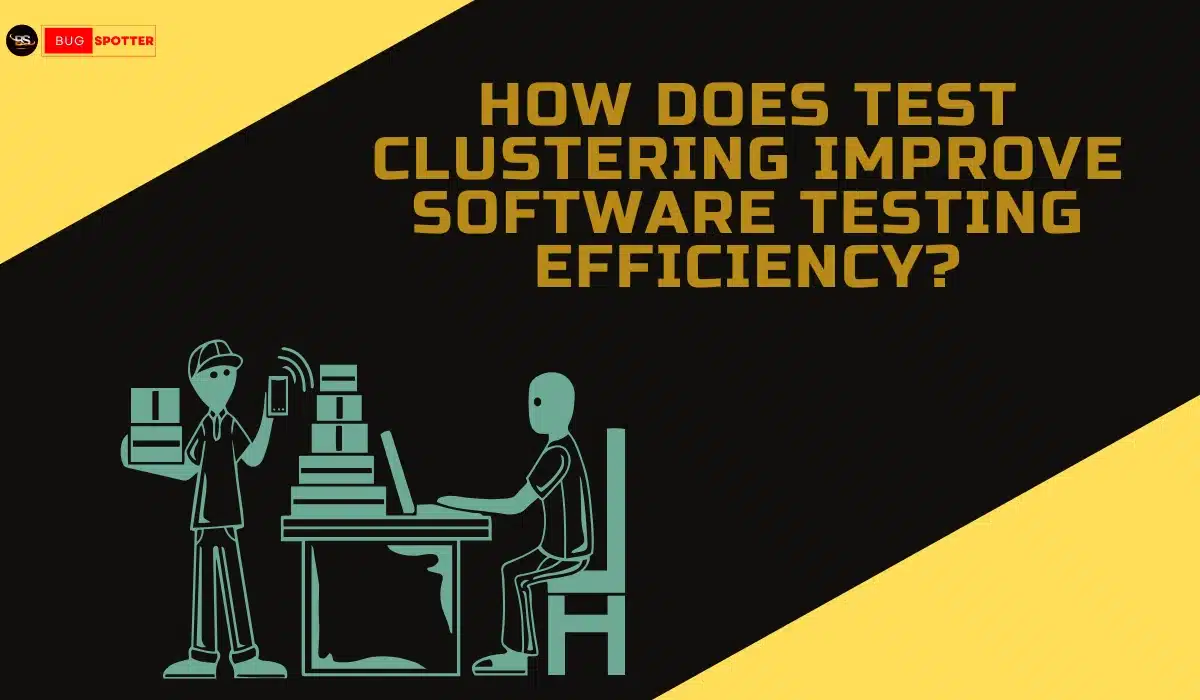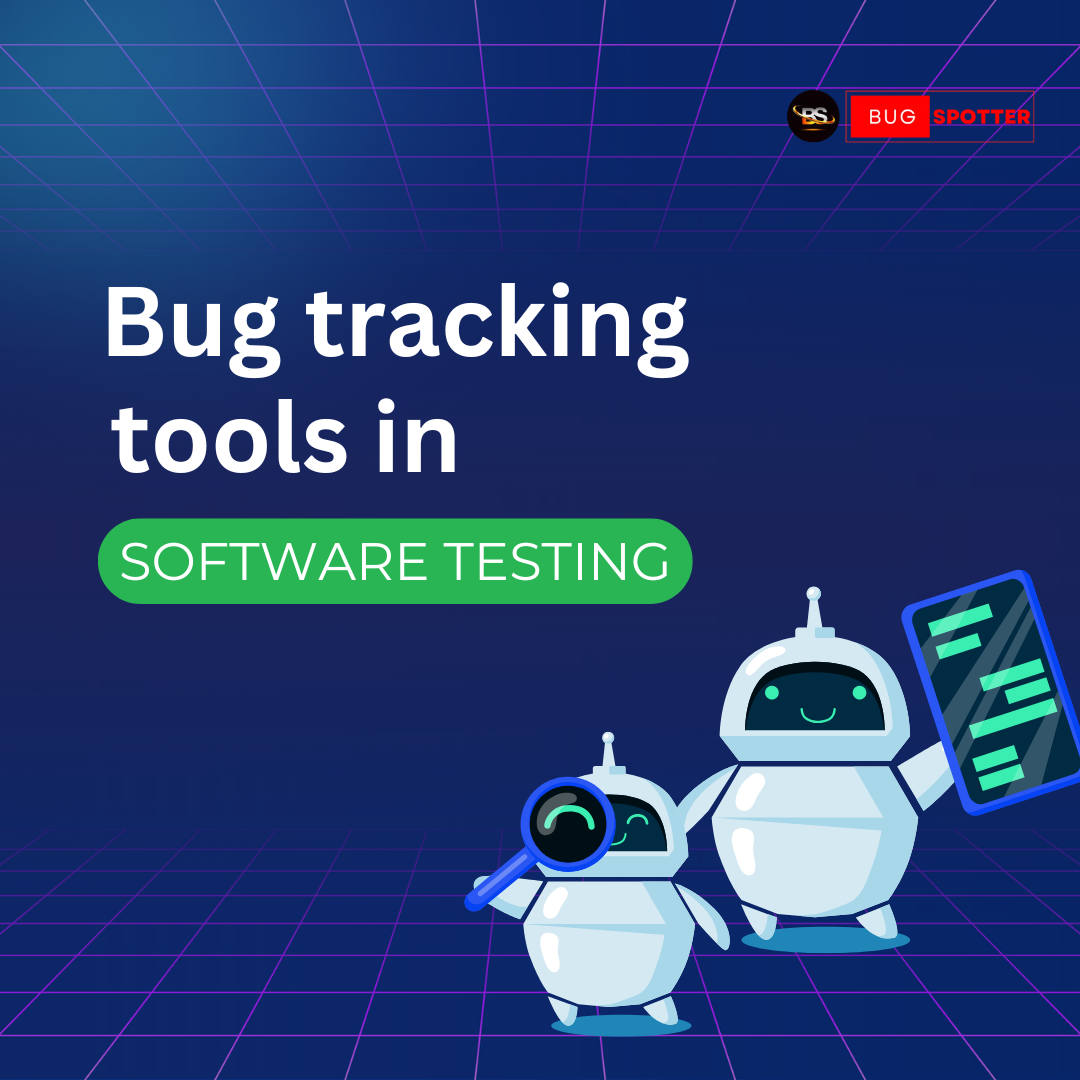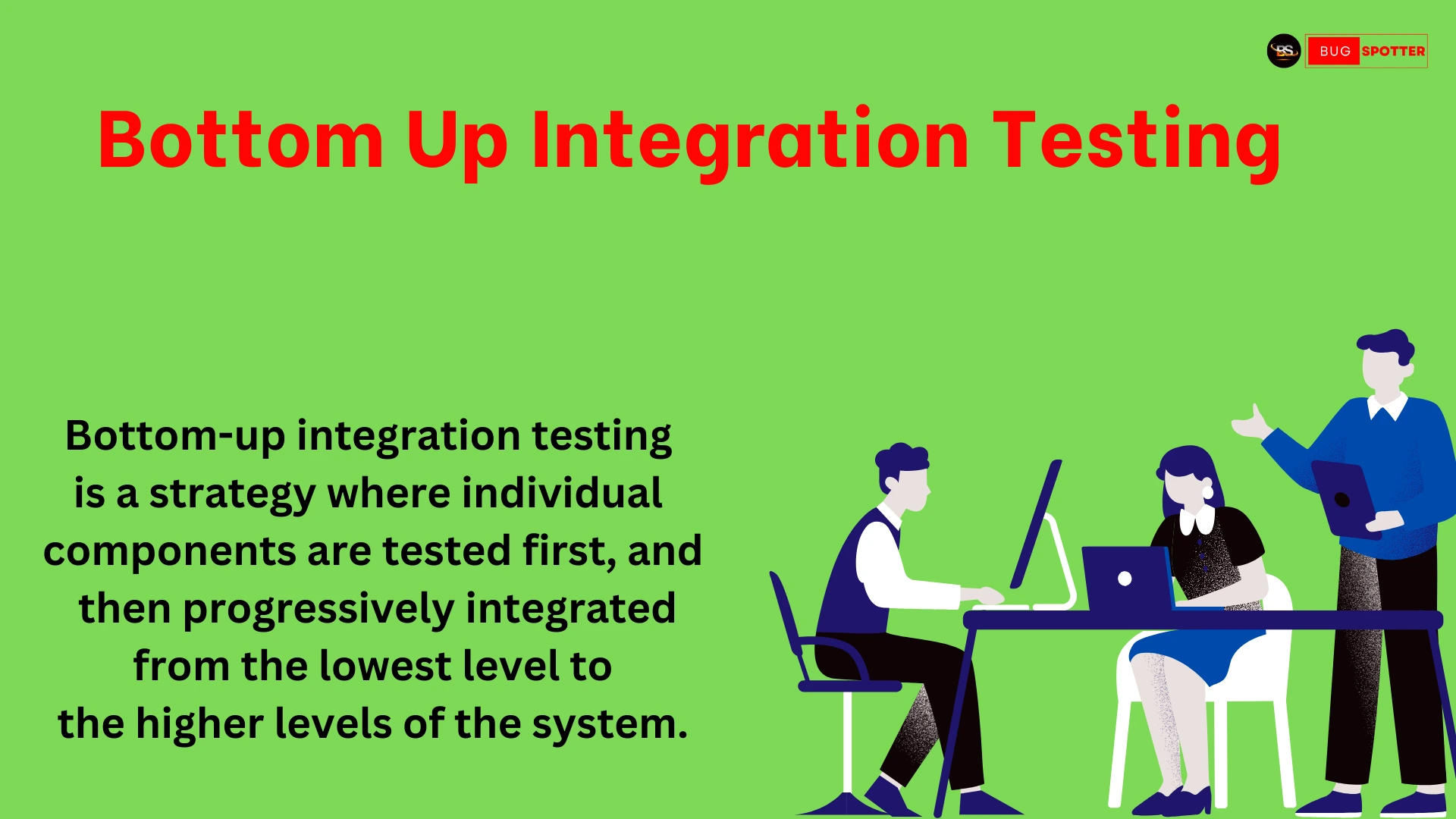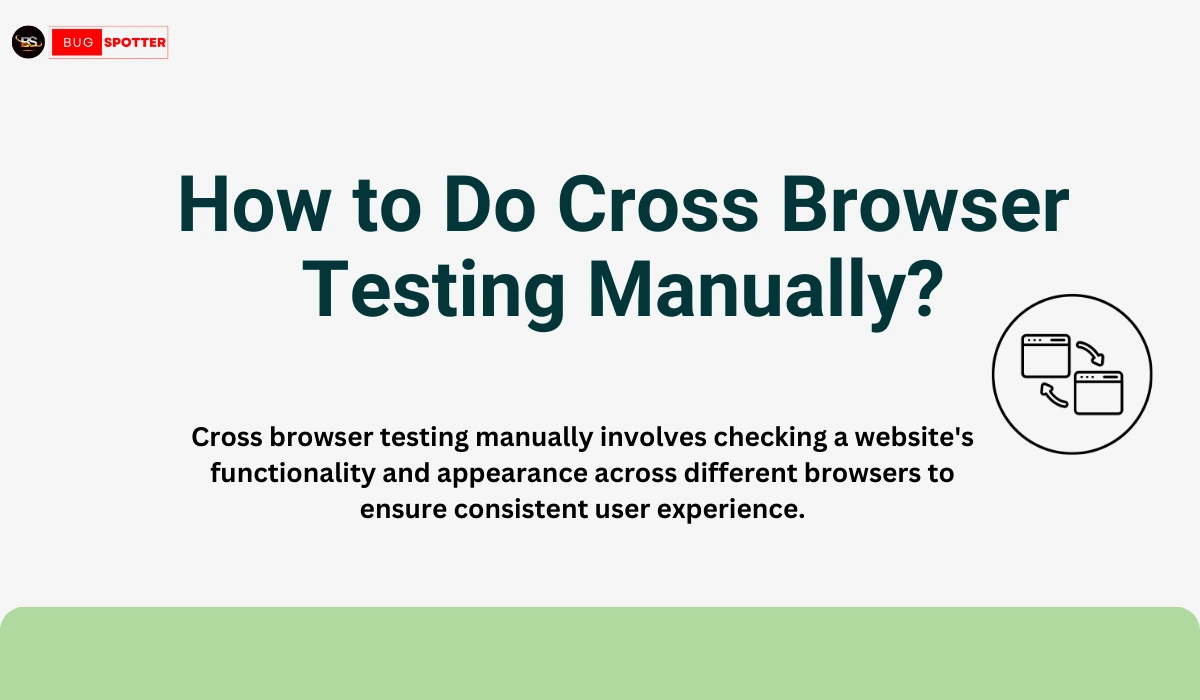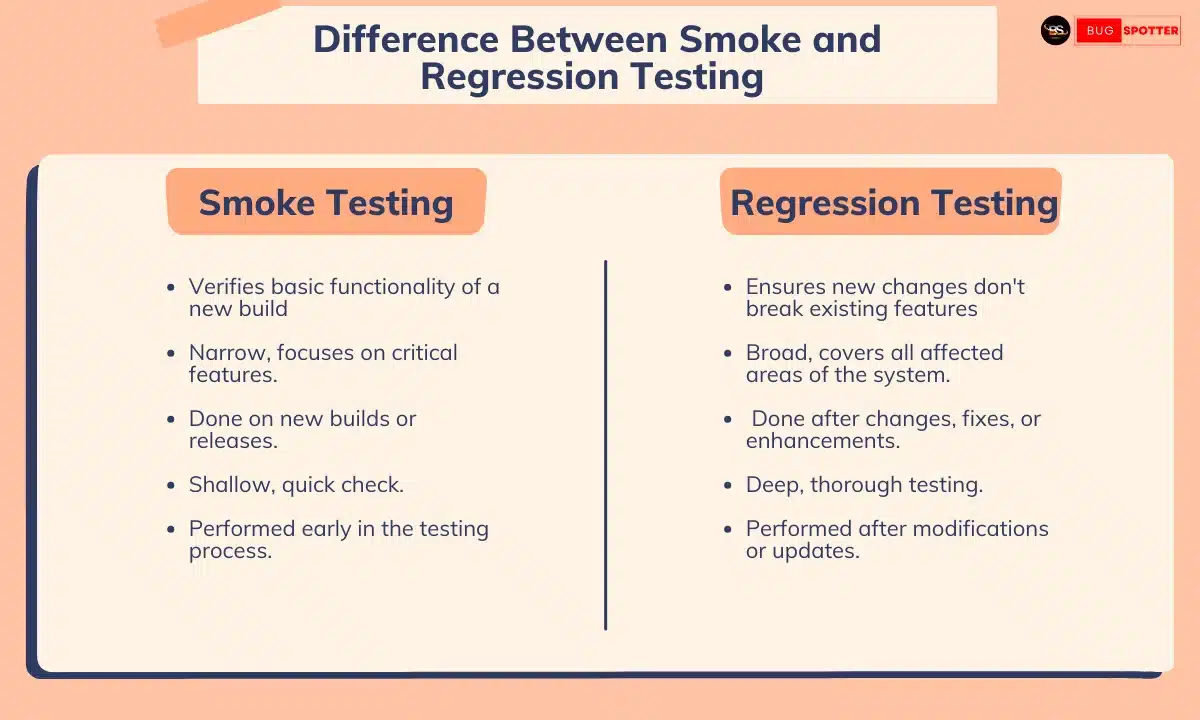Best software testing course in Pune
Best Software Testing Course In Pune with 100% Placement
100% Placement Assistance | Live Online Sessions


What Is Advance Software Testing
Software testing is the process of evaluating and verifying that a software application meets its requirements and functions as expected. It plays a crucial role in ensuring the quality of the product, especially in the IT industry. Software testing is an irreplaceable technology because before any release, human intervention is necessary to ensure the product’s quality and reliability
Become a Certified Software Testing Pro: Join Bug Spotter Today!
Advance Software Testing Syllabus
Term 1
In this term, you will learn basics of software testing and how to ace Models, Ceremonies,Testing Terminologies, etc…
- Introduction
- Software
- Software Testing
- SQA
- SDLC (Software Development Life Cycle)
- SDLC Models:
- Fish Model
- Waterfall Model
- V-Model
- Agile Model
- Agile Ceremonies:
- Daily Scrum Meeting
- Backlog Grooming Meeting
- Sprint Planning Meeting
- Sprint Retrospective Meeting
- Functional Testing
- Non-Functional Testing
- UAT Testing
- Priority & Severity
- Testing Terminologies
Term 2
In this term, you will learn how to ace Test Plans, Methodologies, Tools, etc…
Module 2: Advanced Part
- Test Plan
- Test Methodology
- STLC (Software Testing Life Cycle)
- Bug Life Cycle
- Test Case Design
- Bug Tracking Tool: JIRA
- Accessibility Testing Tool: NVDA
- Performance Testing Tool: J-Meter
- Mobile Testing
- Real Time Interview Questions
Basic of SQL :
- Downloading & Installation of Oracle
- Data Base
- DML Commands
- DDL Commands
- SQL Constrains
- Aggregate Functions
- SQL JOINS
Term 3
In this term, you will learn how to ace Api testing and industry projects
Module 4
Basic :
- Idea of API & API Testing
- Basic Idea of POSTMAN Tool
HTTP Methods :
- GET
- POST
- PUT
- PATCH
- DELETE
HTTP Status Codes :
Practical Demo of API Testing :
Module 5: Core Java
- Basics of Java:
- What is Java
- Data Type
- Variable
- Operators
- Control Statement:
- Conditional Statement
- Jump Statement
- Looping Statement
- Methods (Functions)
- Constructors
- OOPS Concept:
- Inheritance
- Polymorphism
- Encapsulation
- Abstraction
- Access Modifiers
- Advanced Part:
- String Class & Its Methods
- Array
- Collection
- Logical Program
- Pattern Program
Module 6: Selenium WebDriver
- Basics of Selenium WebDriver:
- What is Selenium?
- Introduction to Selenium and Automation Testing
- Selenium Architecture
- How to Download and Install Selenium WebDriver
- What is WebDriver and WebElement and Its Methods?
- First Automation Script
- Locators in Selenium
- XPath Locators and Its Types
- FindElement() and FindElements() Methods
Module 7: Framework and DevOps
- Actions on WebElement and TestNG:
- How to Select DropDown from Selenium WebDriver
- How to Take Screenshot in Selenium WebDriver
- Actions Class in Selenium
- Selenium Waits
- Popup Handling in Selenium
- How to Handle Iframe
- Read and Write Excel Data
- How to Download and Install TestNG
- TestNG Annotations, Keywords
- Cross Browser Testing
- TestNG Groups - Include and Exclude with Example
- xml and Reports
- Page Object Model
- Maven
- BDD Framework
- Git, GitHub
- Jenkins
- Banking Domain
- Telecom Domain
- E-Commerce Domain
- Healthcare Domain
- Technical Doubt Sessions
- Non Technical Doubt Sessions
- Resume Building
- Placement Process
Why software testing course in Bug Spotter Software Training Institute Pune

Daily Doubt Sessions

Daily Mock Tests

Weekly Mock Interview

Alumni Guidence

Resume Preparation

Job Assistance

Expert Trainers

Self Paced Learning

Students Felicitations
Benefits of Our Software Testing Course Certification:
Our Certificate is widely recognized and accepted by leading companies such as Capgemini, Infosys, TCS, Tech Mahindra, and many other top-tier organizations. Earning this certification provides you with a competitive edge and validates your expertise in the field, offering several key benefits:
Benefits of Our Certification:
- Industry Recognition: Gain credibility and recognition from top IT companies.
- Career Advancement: Enhance your job prospects by showcasing specialized skills valued by industry leaders.
- Skill Validation: Prove your technical competence and stay ahead in the competitive job market.
- Better Salary Prospects: Certified professionals are often eligible for higher-paying roles and promotions.
- Networking Opportunities: Join a community of certified professionals and expand your professional network.
- Improved Confidence: Build confidence in your abilities, knowing you have validated knowledge and skills.
Get Certificate
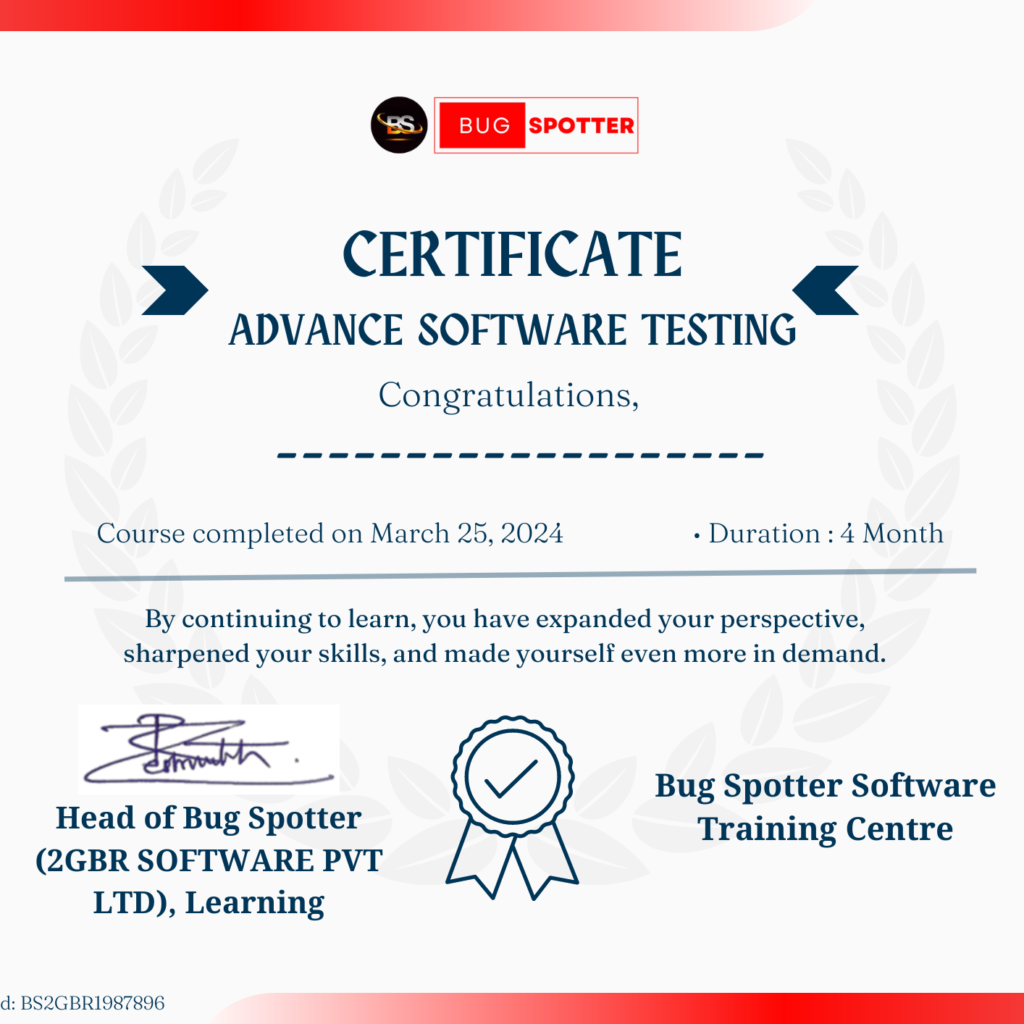
Step-by-Step Preparation for Software Testing

Start with Manual Testing
- Begin by learning manual testing techniques, as this provides a strong foundation for understanding the software testing process.
- Duration: Manual testing, along with SQL and API testing, should take around 1.5 months to complete.
- Focus Areas: Learn how to write test cases, execute them, and report bugs. Also, understand database testing using SQL queries and RESTful API testing.
Move to Core Java Basics
- Once manual testing is complete, it’s important to dive into Core Java basics, as it’s critical for automation testing.
- Why Core Java?: Core Java will help you write scripts for automation tools like Selenium, and understanding object-oriented programming (OOPs) concepts is crucial for automation frameworks.
Learn Selenium for Automation Testing
- Start Selenium Automation: Once you’ve covered Java basics, begin learning Selenium for automation testing. Selenium helps you automate web applications for testing purposes.
- Parallel Learning: While learning Selenium, continue reinforcing your knowledge of Core Java and work on building your understanding of OOPs concepts and logical programming.
- Duration: Selenium, along with Java learning, should take another 1.5 months.
Complete the Learning Process in 3 Months
- In total, manual testing (including SQL and API testing) and automation testing (Core Java, OOPs, Selenium) will take around 3 months.
- By this time, you’ll have covered both manual and automation testing, gaining hands-on experience in real-world testing tools.
Work on Projects
- Once you have completed the course, it’s essential to start a project that involves both manual and automation testing.
- Working on projects will give you practical experience, help build your portfolio, and prepare you for real-world testing environments.
Enroll Now and get 15% Off On Course Fees
Day in the Life of a Bug Spotter Student
We conduct 2-hour online classes daily and offer 24/7 support for doubt resolution. Additionally, we provide 1 dedicated mock exam to ensure thorough preparation
Common Myths About Software Testing
Myth 1: Testing is Easy
Contrary to popular belief, software testing is not an easy job. It requires a keen eye for detail, analytical skills, and a thorough understanding of the software development process.
Myth 2: Automation Replaces Manual Testing
While automation testing is important, it does not replace manual testing. Both types of testing complement each other and are necessary for a robust testing strategy.
Myth 3: Testing is Not a Career Path
Software testing offers a rewarding career path with numerous opportunities for growth and specialization. Testers can advance to roles such as QA Manager, Test Architect, and even CTO.
Best Software Testing Course in Pune
Enrolling in a software testing course with 100% placement assistance can be a game-changer for aspiring testers. Bug Spotter Software Training Institute offers comprehensive training and unwavering support, ensuring that graduates are well-equipped to enter the industry and succeed. With a focus on both automation and manual testing, Bug Spotter provides a balanced education that meets the demands of today’s tech landscape.
FAQ
What are the prerequisites for enrolling in the Best Software Testing Course in Pune at Bug Spotter?
No specific prerequisites are required. However, having a basic understanding of computer science and a keen interest in software testing will be beneficial for getting the most out of the course.
How long does it take to complete the Best Software Testing Course in Pune at Bug Spotter?
The duration varies depending on the specific course. Generally, the software testing courses, including both manual and automation, can be completed within 3 to 6 months.
Does Bug Spotter offer online courses?
Yes, Bug Spotter offers the Best Software Testing Course in Pune both online and in-person to cater to the needs of all students, providing flexibility for remote learners.
What kind of job roles can I expect after completing the Best Software Testing Course in Pune at Bug Spotter?
Graduates can pursue roles such as Quality Assurance (QA) Tester, Automation Engineer, and Manual Tester, among others in the tech industry.
Is 100% placement assistance guaranteed in the Best Software Testing Course in Pune?
While Bug Spotter guarantees strong placement assistance, securing a job ultimately depends on the student's skills, performance, and interview preparedness. The institute has an excellent track record of successful placements.
Can I get financial aid or scholarships for the Best Software Testing Course in Pune?
Yes, Bug Spotter offers scholarships based on merit and financial need. For detailed information on scholarship eligibility, visit the Bug Spotter website or contact the admissions office.
Are there weekend or evening classes available for the Best Software Testing Course in Pune?
Yes, Bug Spotter offers flexible scheduling, including weekend and evening classes, to accommodate the needs of working professionals and students with busy schedules.
What kind of support do students receive after completing the Best Software Testing Course in Pune?
Bug Spotter provides ongoing career support for its alumni, including job updates, networking events, and professional development resources to help students advance in their careers.
Do I need to have any programming knowledge before enrolling in the automation testing course?
Although prior programming knowledge is helpful, it is not mandatory. Bug Spotter’s Best Software Testing Course in Pune is designed to teach the essential programming skills required for automation testing.
How does Bug Spotter ensure its curriculum for the Best Software Testing Course in Pune stays up-to-date with industry standards?
Bug Spotter continually updates its curriculum by collaborating with industry experts, monitoring market trends, and incorporating the latest tools and technologies used in software testing.
Can I take both manual and automation testing courses simultaneously?
Yes, students can enroll in both manual and automation testing courses simultaneously. Bug Spotter offers guidance to help students effectively manage their time and coursework.
What types of projects will I work on during the Best Software Testing Course in Pune?
Students work on real-world projects that simulate industry scenarios. These projects cover various aspects of software testing, from creating test cases to executing automated test scripts.
Does Bug Spotter provide any certification upon course completion?
Yes, students receive a recognized certification upon successfully completing the Best Software Testing Course in Pune, which can significantly enhance their job prospects in the industry.
How large are the class sizes at Bug Spotter?
Bug Spotter maintains small class sizes to ensure personalized attention for each student. This allows for better interaction and individualized support from instructors.
Are there networking opportunities available for students in the Best Software Testing Course in Pune?
Yes, Bug Spotter organizes networking events, workshops, and seminars where students can connect with industry professionals, alumni, and potential employers.
What is the student-to-instructor ratio in the Best Software Testing Course in Pune?
Bug Spotter maintains a low student-to-instructor ratio to ensure each student receives personalized attention and adequate support from the instructors, enhancing their learning experience.
Can international students enroll in Bug Spotter's Best Software Testing Course in Pune?
Yes, Bug Spotter welcomes international students. With online options available, students from around the globe can access high-quality software testing training.
How does Bug Spotter's placement service work for the Best Software Testing Course in Pune?
Bug Spotter’s placement services include resume building, interview coaching, and job matching. The institute collaborates with top companies to provide students with job opportunities and supports them throughout their job search process.
Software Testing Overview
What is Software Testing?
Software Testing is the process of evaluating a software application or system to identify any defects, errors, or gaps in the code. It ensures that the software performs as expected, meets user requirements, and is free from bugs. Testing is an essential part of the software development lifecycle as it guarantees the quality, reliability, and performance of the software.
What is Automation Testing?
Automation Testing is a testing technique that leverages automated tools to execute tests on software. Instead of manually running test cases, automation allows testers to write scripts that automatically perform these tests, saving time and effort.
Why Use Automation Testing?
- Efficiency: Automated tests can run repeatedly at any time, significantly speeding up the testing process.
- Accuracy: Automation minimizes human errors by following exact instructions from the test scripts.
- Cost-Effective: Although the initial investment in automation tools and script development can be high, it reduces overall costs by saving manual testing time.
- Reusability: Once created, automated tests can be reused across different versions of the software, ensuring consistency in testing.
Advantages of Software Testing
- Ensures Quality: Testing identifies defects before the software reaches customers, ensuring a high-quality product.
- Enhances Security: Testing detects vulnerabilities, safeguarding the software from potential security threats.
- Increases Customer Satisfaction: Delivering bug-free, well-performing software boosts customer satisfaction and trust.
- Saves Costs: Fixing bugs early in the development process is far cheaper than fixing them after release.
- Improves Performance: Regular testing ensures that the software performs efficiently under various conditions.
Career Growth in Software Testing
- Entry-Level: Freshers typically start as Manual Testers, learning testing techniques, test case creation, and bug reporting.
- Mid-Level: With experience, testers can move into roles like Automation Tester or QA Analyst, where they work with testing tools and create automated scripts.
- Advanced-Level: Experts may advance to roles such as Test Lead, QA Manager, or Test Architect, overseeing teams, planning testing strategies, and ensuring project quality.
- Specialization: Testers can specialize in areas such as Performance Testing, Security Testing, or Mobile Testing, unlocking more advanced career opportunities.
Importance of Software Testing in IT Companies
- Quality Assurance: Testing ensures that the software meets required quality standards, preserving the company’s reputation.
- Cost Reduction: Detecting bugs early reduces the time and cost spent on resolving issues later in the development cycle.
- Risk Management: Testing identifies potential risks early, enabling companies to address them proactively.
- Compliance and Security: In many industries, software must meet specific compliance and security standards, and testing ensures these are met.
- Customer Trust: Delivering reliable, bug-free software helps build customer trust, leading to better business outcomes and higher customer retention.



